LiveGood Vitamin D with K2- A Comprehensive Guide

The “sunshine vitamin,” more commonly known as vitamin D, is an extremely important nutrient for our well-being. LiveGood Vitamin D does so much more than just keep bones strong. This vital nutrient has direct actions on a number of tissues throughout the body, and in this post, we’ll explore just a few of the many good reasons why we should make sure we are getting enough vitamin D. And remember, vitamins, minerals, and other nutrients work in concert. For example, LiveGood magnesium is needed for enzymes that metabolize vitamin D to work properly, and magnesium helps transport vitamin D from the skin to the liver, converting it to the circulating form in the body. We’ll see more examples of nutrient partnerships, like vitamin K2 as we explore the world of vitamin D.
The Many Benefits of LiveGood Vitamin D3
Calcium Absorption and Bone Health
When most people think of LiveGood vitamin D, they think of the way it benefits the bones. Vitamin D makes it possible for our bones to absorb two very important minerals, calcium and phosphorus. These minerals are necessary for our bones to become and remain as hard as they need to be. If we lack vitamin D, our bones can’t access these two minerals properly, and this makes our bones weak and our skeletal system can become brittle. (or cause rickets in sever cases)
Immune System Support with LiveGood Vitamin D
Vitamin D boosts the disease-fighting powers of monocytes and macrophages (types of white blood cells) and reduces inflammation. It plays a major part in the immune response and potentially decreases the risk of infection.
Mood Regulation and Mental Health
More and more information is emerging that vitamin D is vital for good mental health. Indeed, scientists are now finding that not having enough vitamin D comes with an increased risk for depression. Plus, the vitamin may affect the very mechanism of the brain associated with the condition. Recent evidence also links low levels of vitamin D with an increased risk for dementia, a condition that affects not just memory but mood, judgment, and behavior.
Cardiovascular Health with LiveGood Vitamin D
Vitamin D plays an essential role in heart health, aiding in the management of blood pressure and supporting the overall function of the countless cells that make up the cardiovascular system. It is also a potent anti-inflammatory molecule. In some studies, low blood levels of vitamin D have been associated with an increased risk for several common and serious heart ailments.
Cancer Prevention
Some research indicates that adequate vitamin D levels may be protective against certain types of cancer, including breast, prostate, and colon cancers. Vitamin D’s role in cell growth regulation and apoptosis (programmed cell death) is thought to be a key factor. Some experts believe that vitamin D’s function in regulating the growth and advancement of cells in the body is an integral part of its anti-cancer effects.
Why LiveGood Vitamin D is the Most Important Vitamin
The vast effect vitamin D has on the body’s various systems emphasizes its importance. It is unlike most other vitamins in that the body can make it. The skin synthesizes vitamin D when exposed to ultraviolet sunlight. But sun exposure doesn’t always happen, especially with modern lifestyles, and we often don’t get enough from dietary sources. This is why supplementation can be very important. Remarkably, vitamin D also does something no other vitamin does: When it’s activated in the body, vitamin D becomes a hormone that affects many tissues and organs, markedly influencing gene expression and cellular function and, of course, bone.
Mechanisms Governed by Vitamin D in the Body
Vitamin D takes part in several biological processes:
Calcium Homeostasis
Maintaining serum calcium and phosphate concentrations within the normal range is essential for the mineralization of bones and the prevention of hypocalcemic tetany—a condition that arises when muscles involuntarily contract and is characterized by spasms and cramps. Vitamin D ensures the formation and proper maintenance of the necessary minerals.
Gene Expression Regulation
The vitamin D receptor (VDR) in the nucleus of cells forms a complex with vitamin D. What happens next depends on the cell type. In most cells, vitamin D and its receptor move to the nucleus and influence the expression of genes involved in cell growth, immune function, and inflammation. This mechanism affects many physiological processes and can have a direct impact on our health.
Immune Modulation
The abilities of the immune system—the body’s natural defense against threats from pathogens—to act in a quick and effective way largely depend on the actions of two types of immune cells: the cells of the innate immune system and those of the adaptive immune system. Vitamin D has been shown to have an impact on both of these arms of the immune system, prompting the expression of beneficial molecules that can help to directly and indirectly deal with a pathogen and to turn off the inflammatory response that accompanies many of today’s chronic conditions.
Hormonal Balance
The synthesis and management of numerous hormones are tied to vitamin D. A good example is its impact on insulin. Vitamin D affects the amount of insulin the pancreas produces and influences the cells’ sensitivity to that insulin, which can affect glucose metabolism and the risk of diabetes.
https://pubmed.ncbi.nlm.nih.gov/19916051
https://pubmed.ncbi.nlm.nih.gov/27450565
https://pubmed.ncbi.nlm.nih.gov/24558199
The Synergy of LiveGood Vitamin D with Vitamin K2 and Magnesium
LiveGood Vitamin D and Vitamin K2
Vitamins D and K2 work together to boost bone and cardiovascular health. Vitamin D helps calcium get into our bodies, but we need K2 to be sure that the calcium is directed where it is supposed to be: our bones and teeth. Otherwise, it may end up in our blood vessels or other soft tissues. Vitamin K2’s job seems to be to stop that from happening.
Benefits of LiveGood Vitamin D with Vitamin K2:
- Better Bone Health: Osteocalcin is a protein that our bones use to bind calcium into the bone matrix, where they become an integral part of the structure of the bone, making it harder and stronger. Vitamin K2 activates osteocalcin and should help to maintain good bone health.
- Cardiovascular Protection: The promotion of bone calcium and the prevention of arterial calcium deposition reduce atherosclerosis and the risk of heart disease. Vitamin K2 helps with this.
Vitamin D and Magnesium
Vitamin D, to perform its biological functions, must first be activated. And the mineral most vital to the activation of vitamin D is magnesium. If there’s one reason why the majority of Americans are deficient in vitamin D, it’s because of not getting enough sunlight. If you think you are getting plenty of the sunshine vitamin but your levels are still low then LiveGood Ultra magnesium could be the solution.
Benefits of Vitamin D with Magnesium:
- Enhanced Vitamin D Activation: The conversion of vitamin D into calcitriol, its active form, requires magnesium.
- Muscle and Nerve Function: Muscle function and nerve transmission require magnesium and vitamin D. If either of these minerals is in short supply, you may have an increased risk of muscle cramps and nerve twitches. They sound minor, but if you’ve ever had a really bad muscle cramp, you know how painful and debilitating it can be.
- Bone Density:
- Working alongside vitamin D and calcium, magnesium promotes overall bone health by aiding in bone mineralization.
- Part of this synergy involves the interplay between osteoblasts and osteoclasts, the two main types of bone cells: Osteoblasts work to produce new bone, while osteoclasts dismantle old bone, a process that occurs every minute of the day.
- When magnesium levels aren’t maintained, bone cells perform less optimally. That’s why the body must tightly control magnesium between the two cell types for bone cells to keep a good “balance.”
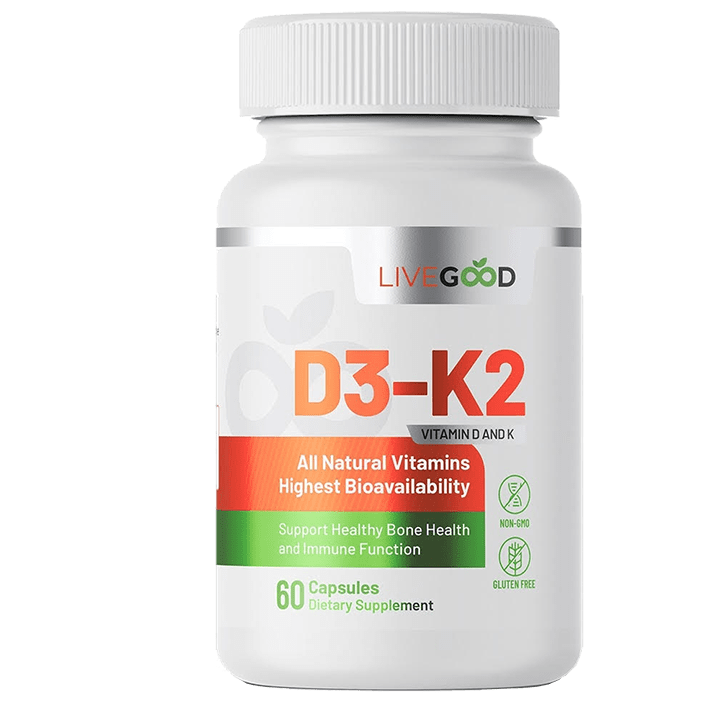

Optimal LiveGood Vitamin D Levels
It is very important for overall health to keep vitamin D levels at their best. Vitamin D in the blood manifests as 25-hydroxyvitamin D—“25(OH)D” for short. This marker of circulating vitamin D varies by age, health condition, and the individual’s particular needs. However, general guidelines suggest:
- Deficiency: < 20 ng/mL (50 nmol/L)
- Insufficiency: 21-29 ng/mL (52-72 nmol/L)
- Sufficiency: 30-100 ng/mL (75-250 nmol/L)
For most people, a target range of 30-60 ng/mL (75-150 nmol/L) is considered optimal. This range supports bone health, immune function, and overall well-being. Keep in mind that 30 is the cutoff. So you are almost at inadequate levels. While the clinical 25(OH)D level is 30 ng/ml, leading functional medicine experts recommend achieving and maintaining vitamin D levels of 50 ng/ml or higher for optimal whole-body health.
Unfortunately almost half the US adult population is in the warning zone of less than 30 ng/mL and most people have no idea.
Getting to 50 ng/mL of Vitamin D is the Goal
Getting to 30 ng/mL of vitamin d is a great start, especially if your levels are below 20 which means you are clinically deficient. But getting close to 50 ng/mL is what we should be shooting for according to research. This is the average level at which most association studies show the most benefits, including immune health, balanced mood, and more. Ask your doctor for a blood test next time you are in to get yourself a baseline value.
How to Actually Get to 50 ng/mL of Vitamin D (and maintain that level)
There ‘s most likely no chance of you hitting these goals with food alone. Considering that a 3 ounce serving of trout only contains 645 IU of vitamin d, which is the best whole food source you can get, you would have to eat a lot of fish to up your numbers substantially.
If you’re thinking you can just get it from the sun, well, that’s just not realistic. You work all day, you are in school all day and most people are just indoors these days. So that leaves you with one option. A high quality supplement. LiveGood vitamin D will this void nicely. It’s ironic because not all vitamin d supplements are created equal and this is actually what led me to LiveGood vitamin D. I was actually taking a d supplement that contained soy bean oil. Why? Most likely because it is cheaper to manufacture. It is better to take your LiveGood vitamin D with some healthy fat but seed oils in my supplements…… No thanks.
This is not exact and depends on things like weight, skin tone etc but it takes 100 IU of vitamin D to increase a healthy adult’s level by 10 ng/mL according to Pharmacokinetic research. What this means is in order to achieve the coveted level of 50 ng/mL you would need 5000 IU of vitamin d. So keep this in mind when you factor in things like food, sunshine and supplementation.
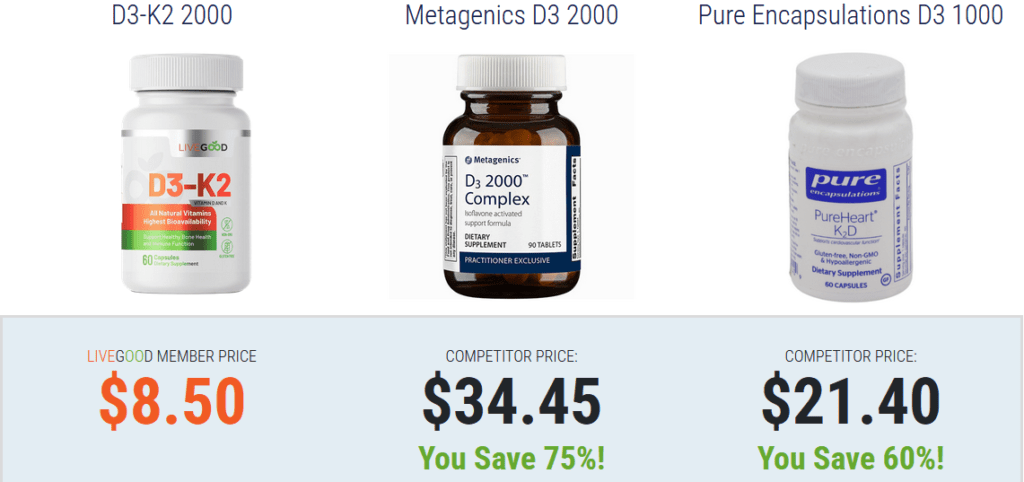
Causes of Vitamin D Deficiency
Vitamin D deficiency can be caused from various factors:
Limited Sun Exposure
Nowadays, many people spend most of their time inside and do not get enough sunlight. This is a big problem because our bodies need sunlight to make vitamin D. Factors such as where we live, the time of year, and the color of our skin all affect how much sunlight we get.
Insufficient Diet
Vitamin D is not present in a lot of foods. There are only a few food sources where you can find it naturally. Fatty fish, like salmon, mackerel, and sardines, are good sources. Also, foods like fortified milk, cheese, and yogurt can be helpful, as can eggs. But these are far from adequate dietary sources as you you may still not get sufficient amounts.
Impaired Absorption
Some health problems, like Crohn’s disease, celiac disease, and cystic fibrosis, can make it difficult to absorb vitamin D in the usual way.
Obesity
Vitamin D is a fat-soluble vitamin and can be stored in body fat. This means that it can be held in fat cells and used by the body over time. If someone is very overweight, they might require more LiveGood vitamin D to achieve the same blood concentration as a slimmer person.
Aging
The ability of the skin to synthesize vitamin D decreases as people get older. Deficiency becomes a greater concern for older adults, especially if they are confined indoors or have limited diets.
Consequences of Vitamin D Deficiency
Vitamin D deficiency can lead to a range of health problems:
Bone Disorders
- Rickets: Severe deficiency of vitamin D in children can result in the development of rickets, which is known for causing bone deformities and growth retardation.
- Osteomalacia: In adults, lack of vitamin D can cause a type of bone softening that leads to leads to weak muscles and fragile, brittle bones.
- Osteoporosis: Chronic deficiency increases the risk of osteoporosis, a condition where bones become brittle and prone to fractures.
Increased Infection Risk
Low vitamin D levels are connected with an increased risk of infections, including respiratory tract infections. Adequate vitamin D is essential for immune defense.
Autoimmune Diseases
Insufficient amounts of vitamin D have been associated with a greater chance of being diagnosed with an autoimmune disease like multiple sclerosis, rheumatoid arthritis, or even type 1 (juvenile) diabetes. The way the immune system functions is vitally important to the development of these and other conditions referred to as “autoimmune.” Vitamin D has certain immune-modulating effects that are important here.
Cardiovascular Diseases
An inadequate amount might aid in the development of cardiovascular illnesses, such as high blood pressure, heart problems, and strokes. Thus, vitamin D’s role is especially vital in these illnesses because it is involved in safeguarding healthy blood pressure and reducing inflammation.
Mood Disorders
Low levels of vitamin D are associated with higher risks of depression, seasonal affective disorder (SAD), and other mood disturbances. Vitamin D’s influence on neurotransmitter production and inflammation may explain these effects.
Cognitive Impairment
New research is showing that a relationship may exist between decreased cognitive function and not having enough vitamin D. This is a major concern because low vitamin D levels are considered a wide-reaching epidemic of insufficiency. And the problem is mostly found amongst the elderly, who seem to be more disposed than any other demographic toward not having enough of this critical nutrient.
Another Vitamin D Study
In another more recent study published online July 26th, 2024, vitamin D was once again shown to have favorable health effects on various cardiometabolic risk factors, including reductions in systolic and diastolic blood pressure, total cholesterol, fasting blood glucose, hemoglobin A1C, and fasting blood insulin.
This groundbreaking research does more than simply yield fresh information about the cardiometabolic health benefits of vitamin D. It underscores the potential of what the researchers call “the medicine of a new era”—the ability to provide individualized patient care that optimally addresses each person’s unique needs and circumstances. Given the worldwide toll taken by cardiovascular diseases, these findings shine a light on one possible pathway toward a more effective preventive strategy.
You can check out the study Modifiers of the Effects of Vitamin D Supplementation on Cardiometabolic Risk Factors: A Systematic Review and Meta-Analysis
In Conclusion
Certainly, one of the most vital vitamins for the body is Vitamin D. This is owing to the fact that it is an essential vitamin that the human body requires to thrive and promote good overall health, from head to toe. Vitamin D is involved in a lot of equally important health functions, including bone mineralization, immune system regulation, and protection against heart disease. Also, ensuring adequate sun exposure, diet, and LiveGood vitamin D supplement intake (along with some combination of vitamin K2 and magnesium potentially supporting bone health) isn’t just suggested, but it’s logical, given that vitamin D is so heavily involved in these kinds of unavoidable body functions. By prioritizing LiveGood vitamin D, we can support our body’s intricate systems and upgrade our quality of life.
LiveGood Vitamin D with k2 Reviews
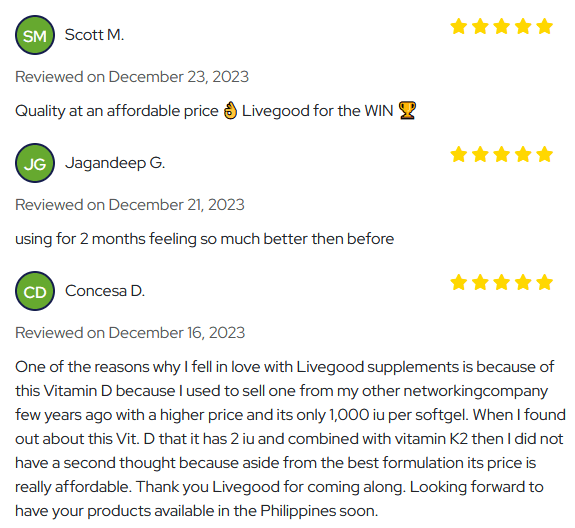
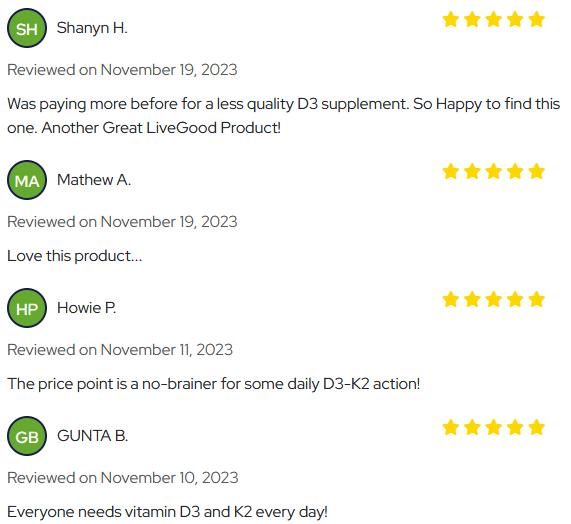
Also be sure to check out our LiveGood Whey Protein Isolate

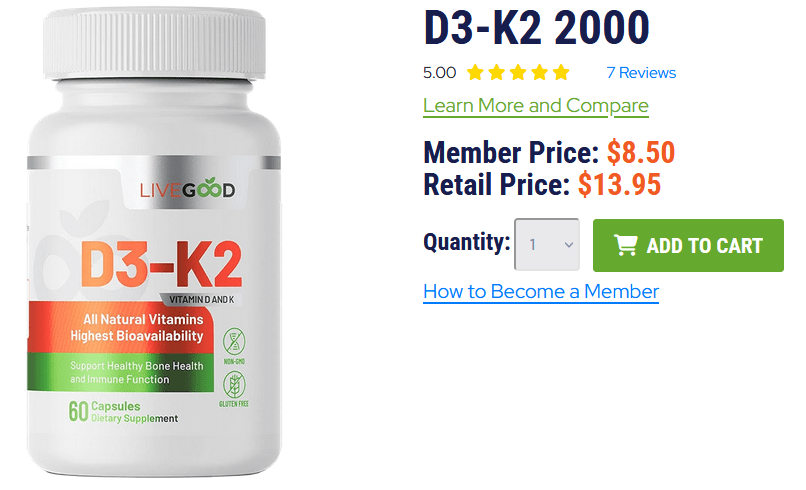
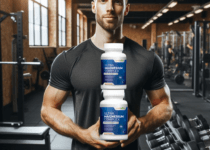
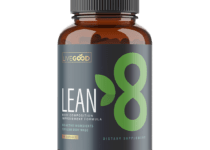

One Comment